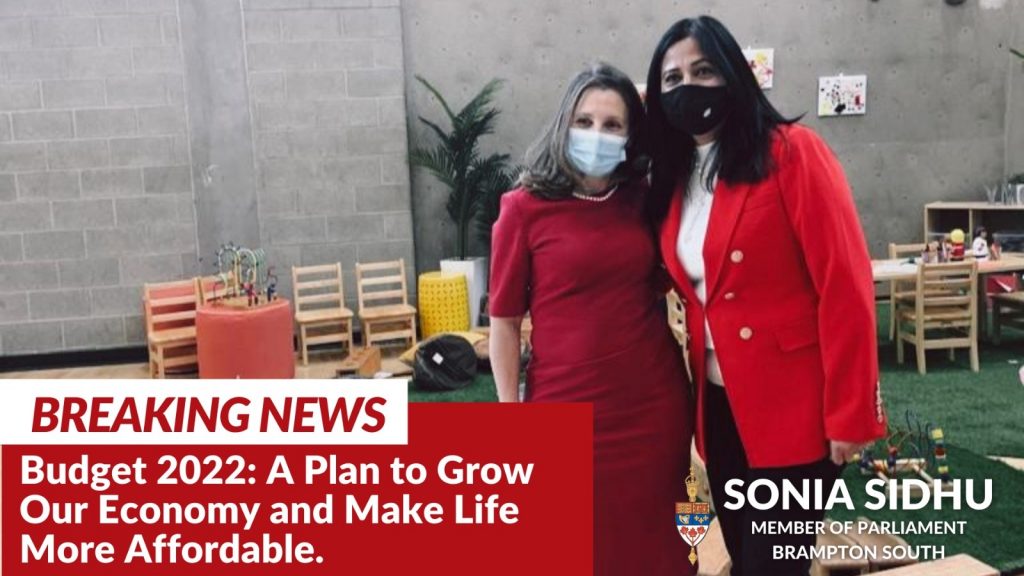The government is revealing tens of billions of dollars in additional expenditure over the next five years in the 2022 federal budget, aiming at “targeted” measures to develop the economy while continuing to reduce the deficit.
From addressing housing affordability to strengthening the Canadian military in the face of global instability caused by Russia’s war in Ukraine and making good on progressive policy commitments that helped keep them in power, Deputy Prime Minister and Finance Minister Chrystia Freeland’s federal budget on Thursday outlines how the federal Liberals plan to steer the Canadian economy through persistent inflation while moving away from pandemic-era massive stimulus spending.
The budget proposes $9.5 billion in additional expenditure for the fiscal year 2022-23, with the largest ticket items focusing on housing supply, Indigenous reconciliation, climate change mitigation, and national defence, while also aiming to generate more than $2 billion in income.
Just over two years ago, COVID-19 struck our communities and began to disrupt our lives. Our government has been there since the beginning to support Canadians and we will continue to do so into the future. Today, the Honorable Chrystia Freeland, Deputy Prime Minister and Minister of Finance, released Budget 2022: A Plan to Grow Our Economy and Make Life More Affordable said Brampton South MP Sonia Sidhu and Sidhu welcomes Budget 2022 that focused on jobs, affordability, and supporting Canadians
Budget 2022 invests in three main things: people; economic growth; and a clean future for everyone.
As we emerge from the pandemic, our focus is making life more affordable for families as we continue to create good jobs, grow the economy, and tackle climate change. Budget 2022 will make a real difference in the lives of Bramptonians and is an important step forward.

Also, Sidhu said, in this Budget, we are making it easier for Canadians to buy a home, moving forward on dental care, helping our businesses scale up and grow making wealthy corporations pay their fair share and Investing in a clean future and helping Canada become a world leader in producing electric vehicles.
Canadians expect us to face the difficulties ahead while continuing to develop the Canada of the future. These initiatives will assist to fuel economic development, enhance women’s labor-force participation, and provide every Canadian with the greatest chance for success.
Finance Minister Chrystia Freeland has presented her second federal budget. Here are the highlights:
HELP WITH BUYING A HOME
The budget proposes tax-free savings accounts, which would allow first-time house purchasers to save up to $40,000. Contributions would be tax deductible, and withdrawals for the purchase of a first home would be tax-free. The initiative is intended to offer $725 million in funding over a five-year period.
AFFORDABLE HOUSING
The government is introducing a new housing accelerator fund worth $4 billion over five years to assist municipalities in accelerating home building. The objective is to build 100,000 additional homes in the following five years. The budget also extends the quick housing project, investing $1.5 billion over two years to build at least 6,000 additional housing units to assist combat homelessness.
DENTAL CARE
Following up on a pledge made in its confidence and supply agreement with the NDP, the government is providing $5.3 billion over five years and $1.7 billion per year after that for an universal dental care programme. It will begin with children under the age of 12 this year and will be expanded to include Canadians under the age of 18, seniors, and persons with disabilities in 2023. The initiative, which is set to be completely implemented by 2025, is restricted to households earning less than $90,000 per year. No co-payments will be needed for people with an income of less than $70,000.
DEFENSE AND SECURITY
The budget increases defence expenditure by $8 billion over five years, increasing Canada’s defence budget to a projected 1.5 percent of GDP. This falls short of the 2% of GDP NATO has asked member countries to spend, particularly since Russia’s conflict on Ukraine started, although the $8 billion includes $500 million in military assistance to Ukraine. The budget also includes $875 million over five years to address escalating cybersecurity risks, as well as $100 million over six years to promote leadership in the Canadian Armed Forces, modernize the military justice system, and execute cultural change in the CAF.
THE ENVIRONMENT AND CLIMATE CHANGE
To assist Canada, reach its climate change commitments, the budget proposes spending $2.6 billion over five years to fund a new investment tax credit for firms who invest in carbon capture, utilization, and storage (CCUS). The government also intends to extend incentives and increase eligibility for a programme that will cost $1.7 billion over five years to attract more Canadians to purchase electric cars, vans, trucks, and SUVs. The government also intends to implement a sales requirement to guarantee that at least 20% of new light-duty vehicle sales be zero-emission vehicles (ZEVs) by 2026; that market share is expected to climb to at least 60% by 2030 and 100% by 2035. The budget also promises $3.8 billion to the creation of Canada’s first strategy to develop exploitation of essential minerals used in everything from phones to aircraft.
INDIGENOUS RECONCILIATION
The budget proposes spending an extra $11 billion over six years to assist Indigenous children, families, and communities, including $4 billion for housing and another $4 billion over seven years to help assure First Nations children’s access to health, social, and educational services. Almost $400 million will be spent over the next two years to upgrade infrastructure on reserves, including $247 million for water and wastewater infrastructure. To achieve a crucial promise on reconciliation, the budget includes $210 million to assist communities in documenting, locating, and memorializing burial sites at former residential schools. The funds will also help the National Centre for Truth and Reconciliation pay for a new facility and aid in the “full disclosure” of government records linked to residential schools. The budget allocates just more than $5 million over five years to let the RCMP to help with community-led inquiries into burial sites at former residential schools.
DIVERSITY AND INCLUSION
In keeping with the government’s diversity and inclusion policy, the budget provides $100 million over five years for a federal LGBTQ2 action plan, $85 million more to assist continuing work on the anti-racism strategy, and $50 million to help Black-led and Black-serving community groups. It also promises $15 million to encourage local journalism in disadvantaged places and to assist racialized and religious minority journalists in sharing their experiences and viewpoints.
















